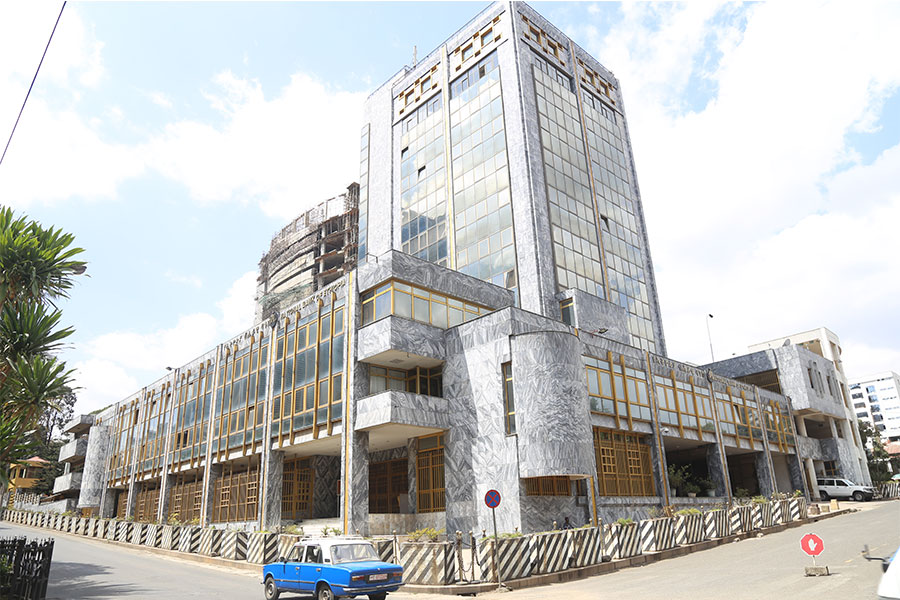
Radar | Sep 10,2022
Nov 4 , 2023
By Selome Getachew
The banking landscape has exhibited a peculiar dichotomy recently. On one end, there is an applaudable growth in deposit accounts and value; on the other, a looming crisis brought about by non-performing assets.
The latest data from the National Bank of Ethiopia (NBE) paints a spirited picture, with deposit accounts soaring to 129.52 million in June 2023, up from 98.59 million the previous year. This has prompted many banks to announce their achievements to shareholders with justifiable pride.
Yet, beneath the impressive numbers lies a troubling problem: a growing default on loan repayments. The magnitude of this problem has driven many banks to reconsider their loan strategies, particularly those meant for export advances and pre-shipment guarantees. Disturbingly, several banks are now demanding up-front payments, running into hundreds of millions, as punitive measures against erring companies. This aggressive posture derives from the latter's failure to remit foreign currency as promised against their approved loans.
Experts pin the repayment failure on a well-entrenched malpractice: diversion of bank-provided funds. Many corporate borrowers have institutionalised the unethical habit of maintaining dual financial statements – one for the bank's loan appraisal and another for annual tax assessments. With bank-approved business plans becoming mere paper formalities, coupled with a lacklustre monitoring system post-loan disbursement, the system is rife for manipulation.
Financial malpractice is not just confined to financial statements.
The property market has become a playground for diverting funds earmarked for business ventures. This has triggered a volatile property price regime, rare in other markets, with property prices in prime locations in Addis Abeba soaring to unimaginable highs. In a startling revelation, the price for a square meter of property in the city was sold at a mind-boggling 187 times the threshold price set by municipal authorities in a land lease auction issued by the City Administration
The question that should intrigue: with such exorbitant real estate prices and the evident economic instability, what is fuelling this demand?
Perhaps the answer lies overseas, with Ethiopians emerging as one of the leading groups of real estate magnates in Dubai's luxurious property market.
Ironically, the core of Ethiopia's economic strategy seems somewhat sidelined. The lion's share of the disbursed loans is not channelled towards the manufacturing sector – which should have been the primary focus. Instead, the ease of import businesses and oft-mismanaged export ventures dominate, leading to a skewed loan distribution. This, combined with a banking system more focused on loan repayment than the actual end-use of the funds, creates a precarious situation.
Signs of this financial recklessness are now beginning to manifest in the real estate market. With barely checked borrowing practices and the diversion of funds into property, the market is inflated artificially, making it susceptible to drastic corrections. The property bubble, if it bursts, could lead to significant financial chaos.
Acknowledging the gravity of the situation, regulators at the central bank have stepped in, rolling out a directive targeting squarely the reigning in inflation and modulating the loan-to-deposit ratio. This empowers them to keep a stringent check on loan approvals. Initial reports indicate the directive is working. The frantic pace of property transactions has cooled, with property prices in the higher bracket showing a marked decline. But it is not all rosy.
The default in repayment has inadvertently led to a liquidity crunch for several banks. Some even resorted to a bailout from the central bank, albeit at a stiff 18pc interest.
This ongoing financial reel reveals a lack of transparency in the business world. The widespread misallocation of loans, unchecked by the lenders, puts the country's economic stability at risk. For a sustainable financial environment, there should be a pressing need for rigorous oversight mechanisms. These should promote financial discipline, transparency, and the judicious use of borrowed funds.
PUBLISHED ON
Nov 04,2023 [ VOL
24 , NO
1227]


Radar | Sep 10,2022

Radar | Feb 24,2024

Radar | May 31,2020

Fortune News | Mar 16,2019

My Opinion | Dec 23,2023

Photo Gallery | 178381 Views | May 06,2019

Photo Gallery | 168581 Views | Apr 26,2019

Photo Gallery | 159376 Views | Oct 06,2021

My Opinion | 137069 Views | Aug 14,2021
Commentaries | Oct 25,2025

Dec 22 , 2024 . By TIZITA SHEWAFERAW
Charged with transforming colossal state-owned enterprises into modern and competitiv...

Aug 18 , 2024 . By AKSAH ITALO
Although predictable Yonas Zerihun's job in the ride-hailing service is not immune to...

Jul 28 , 2024 . By TIZITA SHEWAFERAW
Unhabitual, perhaps too many, Samuel Gebreyohannes, 38, used to occasionally enjoy a couple of beers at breakfast. However, he recently swit...

Jul 13 , 2024 . By AKSAH ITALO
Investors who rely on tractors, trucks, and field vehicles for commuting, transporting commodities, and f...

Oct 25 , 2025
The regulatory machinery is on overdrive. In only two years, no fewer than 35 new pro...

Oct 18 , 2025
The political establishment, notably the ruling party and its top brass, has become p...

Oct 11 , 2025
Ladislas Farago, a roving Associated Press (AP) correspondent, arrived in Ethiopia in...

Oct 4 , 2025
Eyob Tekalegn (PhD) had been in the Governor's chair for only weeks when, on Septembe...

Oct 25 , 2025 . By YITBAREK GETACHEW
Officials of the Addis Abeba's Education Bureau have embarked on an ambitious experim...

Oct 26 , 2025 . By YITBAREK GETACHEW
The federal government is making a landmark shift in its investment incentive regime...

Oct 29 , 2025 . By NAHOM AYELE
The National Bank of Ethiopia (NBE) is preparing to issue a directive that will funda...

Oct 26 , 2025 . By SURAFEL MULUGETA
A community of booksellers shadowing the Ethiopian National Theatre has been jolted b...